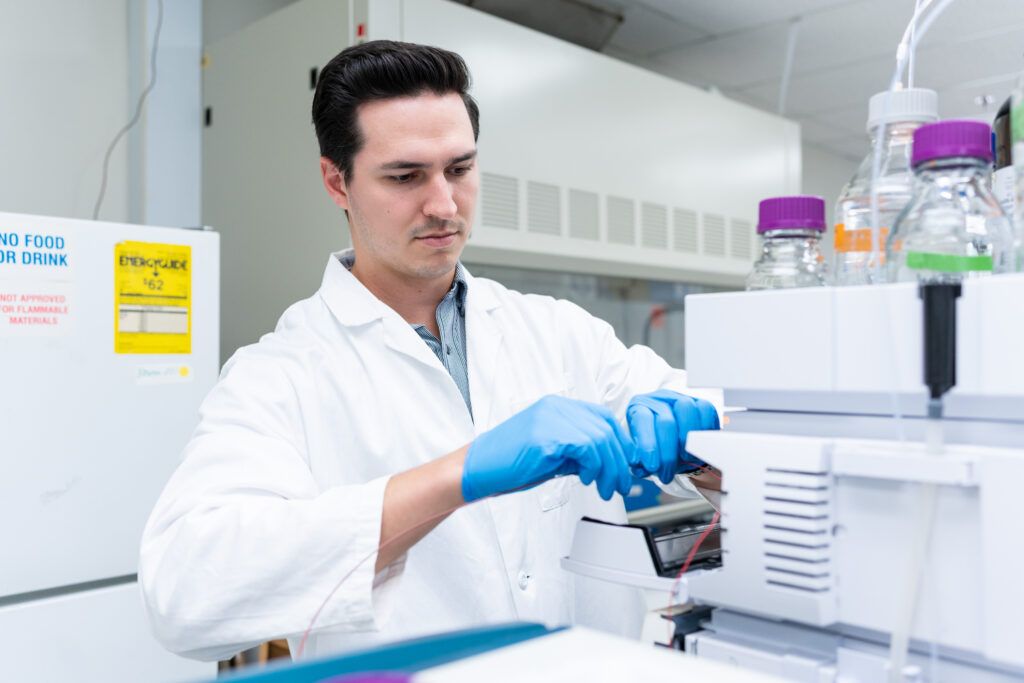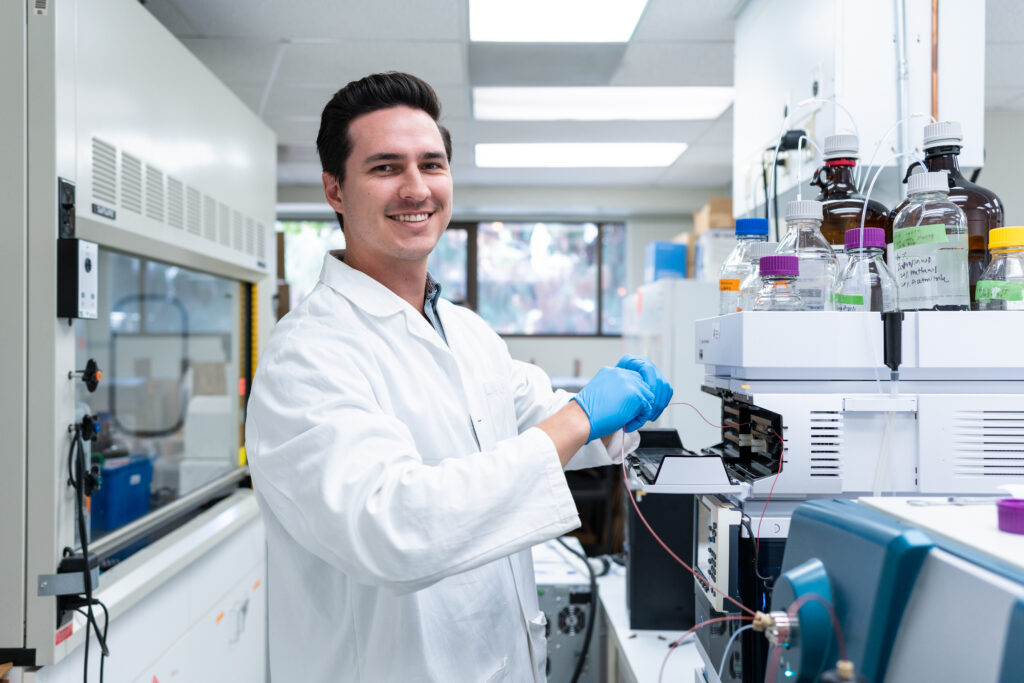A family history of Parkinson’s and Alzheimer’s disease spurs PhD candidate Brandon Ebright to pursue more effective therapies for neurodegenerative diseases. What can be done to prevent, slow and cure these conditions? Ebright is determined to find answers.
“We know so little about the brain and how it works. There is just so much opportunity to make a difference,” Ebright says.
His maternal grandfather was diagnosed with Parkinson’s in 2018, around the same time his paternal grandmother was found to have Alzheimer’s. Ebright notes that the two diseases have a lot of overlap—including the fact that, while some approved drugs mitigate certain symptoms, no prevention or cure for either condition yet exists.
To save money, Ebright was living at his grandparents’ house in Glendale, Calif. in 2019, when he started the PhD program at USC Mann. So he witnessed firsthand the cognitive declines his grandmother faced.
“She was still driving when I moved in, and could do her everyday tasks just fine,” Ebright recalls. “But within a year, she wasn’t able to drive anymore, and she would become very forgetful. She started to need help with many things.”
To protect his grandparents during the COVID-19 pandemic, Ebright decided to move out. Now, with his 90-year-old grandfather, who is “still very sharp” and a full-time caretaker at home, Ebright says his grandmother is in stable condition.
Having a history of Alzheimer’s and Parkinson’s disease in his family, Ebright devotes much of his graduate research to advancing the understanding of neurodegenerative disease. “The diagnoses definitely motivated me to work harder, and have made me a lot more emotionally invested,” he says.
That commitment is paying dividends in the laboratory. Earlier this year, he earned the 2023–2024 Charles and Charlotte Krown Fellowship, which recognizes excellence in research and academics. The USC Mann School’s most prestigious graduate student award, the Krown Fellowship includes funding for Ebright’s chosen research.
For Ebright, that focus is on identifying potential drug targets for Alzheimer’s disease and finding correlations between neuroinflammation and cognitive performance.
Examining Brain Lipids to Identify Potential Drug Targets for Alzheimer’s
In 2022, Ebright served as first author of a study into the mechanisms of brain inflammation in Alzheimer’s disease that was published in Alzheimer’s Research & Therapy. The research resulted from a collaboration between the laboratory of Stan Louie, professor of clinical pharmacy and director of the Mann School’s Clinical Experimental Therapeutics Program, Hussein Yassine of the Keck School of Medicine of USC and scientists at Rush University Medical Center in Chicago.
Using advanced techniques to examine brain lipids, the team identified greater lipid measures of chronic neuroinflammation in the brain tissue of patients with APOE4 (the strongest risk-factor gene for Alzheimer’s) and dementia compared to people without the gene. The researchers then identified an enzyme, calcium-dependent phospholipase A2 (cPLA2), that drives brain lipid changes. Drugs that can inhibit cPLA2 activity are potential targets to limit neuroinflammation for persons with APOE4 and dementia.
After an initial study of 42 human brains using lipidomics—a challenging approach for graduate students, according to Louie—Ebright is now finishing the second part of the study. Funded by the National Institute of Aging, Ebright and colleagues are using brain tissues and plasma samples collected from more than 200 patients and working to develop novel cPLA2 inhibitors.
Finding Answers Within Large-Scale Datasets in Novel Research

Ebright says the team approaches the project from different angles to investigate how supplementation with Omega-3 fatty acids, like docosahexaenoic acid, may help slow or stop cognitive decline in early-stage Alzheimer’s patients. And for people already past that point, the researchers are looking for ways to alleviate some of the neuroinflammation that causes symptoms.
Since Ebright’s work relies heavily on mass spectrometry, the Mann School’s Multi-Omics Mass Spectrometry Core is a frequent destination. Other destinations have been much farther away. With funding from the school, Ebright has journeyed to conferences across the U.S. and Europe to present findings and network with fellow scientists.
Ebright’s tenacity and innovative spirit play a big role in his research success, Louie says. “Brandon is an analytically outstanding student scientist,” he adds. “He has the outstanding potential to become a transformative scientist, and I am fortunate to have him as a student.”
The Krown Fellowship provides an award of $10,000 for salary and discretionary research funds.


